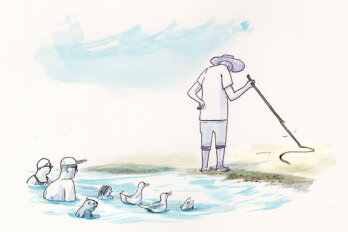My grandfather spoke Latin at the breakfast table
over his All-Bran and two stewed prunes, read
Paris Match in the loo, referred to his many
grandchildren as little cannon fodder. What else
do I remember of my childhood summers? Raspberry
canes, sweet peas the length of the garden fence,
the English oaks my grandfather had planted
from the acorns he brought with him when he emigrated
after the First World War. Learning to sew, painstakingly,
play tennis, desperately, at Jericho Beach, the air sauced
with heat, the fierce walk home, uphill all the way,
to Trimble and Thirteenth. Shelling peas on the back porch,
the satisfying ping as each pea bounced
off the sides of the stainless-steel bowl. The potatoes
my grandfather planted in the boulevard, the humbugs
he kept in a jar on the mantle, above the rows of Penguin
Classics with their intelligent orange spines; how I desired,
beyond all reason, those unreachable sweets and how
my grandfather, possessed of the ability to read my mind,
offered me one every evening, after supper.
African violets on the windowsill, the scent of rose
geraniums. The Rock Cakes my grandmother made
using bacon fat before it was considered unhealthy
and tomato sandwiches on thin slices of the solid
white bread my grandfather baked every Saturday. Salt,
freshly ground pepper, a smear of butter, mayonnaise
we couldn’t afford at home. We took tea on the juggernaut—
what my grandfather called the well-braced garden bench
he’d built himself, in the basement, where the shelves
were lined with my grandmother’s preserves—peaches
like wedges of wet sunlight, bletted medlars and quince,
gibbous moons of pears. Everything my grandfather built
was “well braced”—the measure of a good carpenter,
I observed.
In winter, when I visited, I was awakened each day
by the sound of my grandfather shovelling coal in the basement
to feed the furnace, a sound I found comforting because
I could count on it. Wading through spring snow on the UBC
endowment lands in search of his sapling oaks, home
through the woods above Sixteenth Avenue, where he would stop,
ignoring my impatience, to whisper, “Hark at the bird!”
You cherish them, then they are gone. What more can be said.
My grandfather’s dying words were Sunt lacrimae rerum.
My grandmother’s, What is going to become of me?




